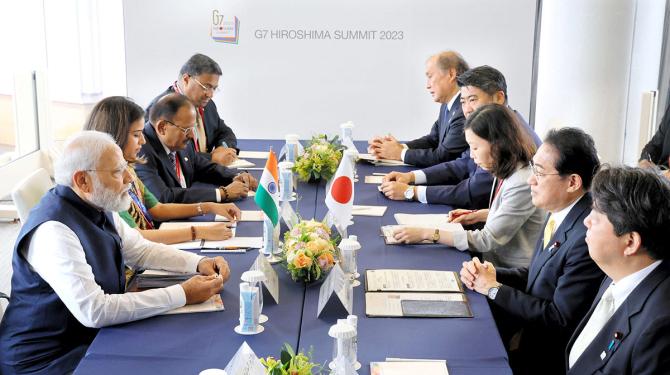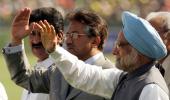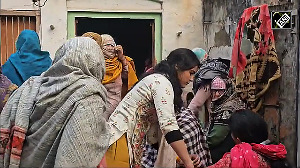India would not be seen to be anything but rude with the Pakistanis.
In the big picture, who is the bigger adversary right now?
Who is the bigger pain in the neck?
And who is it that is keeping more than 3,000 km of our borders active, throwing our military posture and deployments into imbalance? asks Shekhar Gupta.

The Shanghai Cooperation Organisation (SCO) foreign ministers' meeting in Goa has produced the usual photo-ops and probably even some important outcomes in backroom conversations.
It should also make us reflect on the proliferation of similar multilateral organisations, what they stand for, and what they mean for India.
As the name indicates, the SCO is a China-inspired and, whatever the pretence, China-led organisation.
Look at the two others that have come up more or less in the same era, the past two decades: BRICS (Brazil, Russia, India, China, South Africa) and RIC (Russia-India-China) forums.
Three countries are common to these. China, Russia, and India. The common factor in all three forums is the pre-eminence of China.
Which is the reason we have listed India as the last of the three.
We know all governments love the razzmatazz of summitry, and the Narendra Modi government revels in it more than any since probably Indira Gandhi's.
But the downside of participating with such enthusiasm in three regional groups led and dominated by China, with Russia as its loyal follower, has to be debated.
We also know that the buzzword these days is multilateralism.
However, what quality and what kind of multilateralism can be expected from China-launched and China-run organisations with a couple of its loyalists, if not near-vassals, and an adversarial India?
It will be triggering for many if we use the expression 'an isolated India'.
Think, however, about any of these three organisations.
China and Russia are now fully hyphenated.
Russian Foreign Minister Sergey Lavrov can speak at a high-powered intellectual hangout in Delhi (ORF's Raisina Dialogue) and admonish both his host and the Indian audience by reminding them that the only country with which they have a written strategic alliance (treaty) is Russia.
This in a country where three successive prime ministers over 25 years hailed another 'essential' and 'natural' strategic partnership, though with the US, not Russia.
This SCO meeting, more than any other lately, serves to underline India's current geopolitical predicament.
It is forced to spend so much time and energy, invest so much political capital, and radiate fake smiles in a grouping where it has so many serious clashes of interest.
It cannot stay away from Russia which, immensely weakened now, is joined at the hip with the Chinese.
At the same summit, at the same tables, India would not be seen to be anything but rude with the Pakistanis. But can it afford to frown at the Chinese?
In the big picture, who is the bigger adversary right now? Who is the bigger pain in the neck?
And who is it that is keeping more than 3,000 km of our borders active, throwing our military posture and deployments into imbalance?
Since hypocrisy is central to the craft of diplomacy and no country is judged for practising it, sleeping with the enemy might not have the same meaning as in people's personal lives.
But, if multilateralism is about widening your options, this supping at China-dominated tables is, unfortunately, more an example of how these are instead becoming limited.
These three supposedly multilateral organisations have come up in the two decades when both India and China have grown phenomenally.
For now, China has won the race for pre-eminence in the extended region.
India's cause is not helped by the fact that, while it may have taken the lead with South Asian Association of Regional Cooperation (SAARC), it's been rendered mostly defunct.
If even within our immediate region multilateral bodies only function with some sense of purpose if they include China, it's a bummer for us as an aspiring superpower.
One way to put the SCO in perspective is to imagine if SAARC, which has India as the dominating partner, expanded to include several other major nations in the region.
Say, Afghanistan, Thailand, the Central Asian Republics, Iran, and Russia.
Would China join such a grouping? And if so, would it still be possible for India to retain any dominance?
Now see how the SCO came into being. It was initially the gathering in 1996 of what was described as the Shanghai Five: China, Russia, Kazakhstan, Kyrgyzstan, and Tajikistan.
The summit on April 26, 1996 resulted in a 'Treaty on Deepening Military Trust' among these five neighbours.
Any doubts about the essentially military-strategic origins of the organisation were answered by what came out of the next year's summit in Moscow, on April 24, 1997: Treaty on Reduction of Military Forces in Border Regions.
Boris Yeltsin and Jiang Zemin also signed a joint declaration on a 'multipolar world'.
The mid-1990s were the peak of unipolarity, where Russia and China were both desperate to create a borough immune from American/Western influence.
This, from the second half of P V Narasimha Rao's tenure onwards, is precisely when India started looking westwards.
On to Vajpayee and through Manmohan Singh to Narendra Modi, the movement was in that direction.
Now, nostalgia for the non-aligned years is back in India, probably as an instinctive reaction to Western institutions and governments' criticism and questioning of the Modi government's record on human rights, civil liberties and the minorities.
The revived suspicion of the West has brought multilateralism back in fashion.
Funnily, the only places where we seek refuge are the organisations China founded or dominates.
That is the problem with the SCO, BRICS, RIC, all the organisations Mr Lavrov had reminded us of.
What compounds the problem is that over the decades, India has failed even to build a regional forum of its own to create a sense of a geopolitically limited multilateralism, however limited
These bodies, the SCO in particular, given its military-strategic priorities, do not help India's quest for strategic autonomy.
On the contrary, they only limit it.
Today, if you have Russia and China sitting at the same table with you, you know which friendship is stronger and which relationship is adversarial.
Together, they constrain India's options on the groupings where its current strategic interests lie. The Quad, for example.

To have your avowedly best friend of six decades as not just the new, essential strategic ally of your most significant adversary and even dependent on it is a bummer.
It also exposes India's most painful vulnerability, on military equipment.
To be fair, you can't blame Mr Modi or S Jaishankar for this, because they did not dig this hole.
Nor did they walk India into it. They have to navigate a way out of it.
Or at the very least, buy a decade of relative peace and stability, without bartering one half of India's strategic autonomy for the sake of the other.
By special arrangement with The Print











 © 2025
© 2025